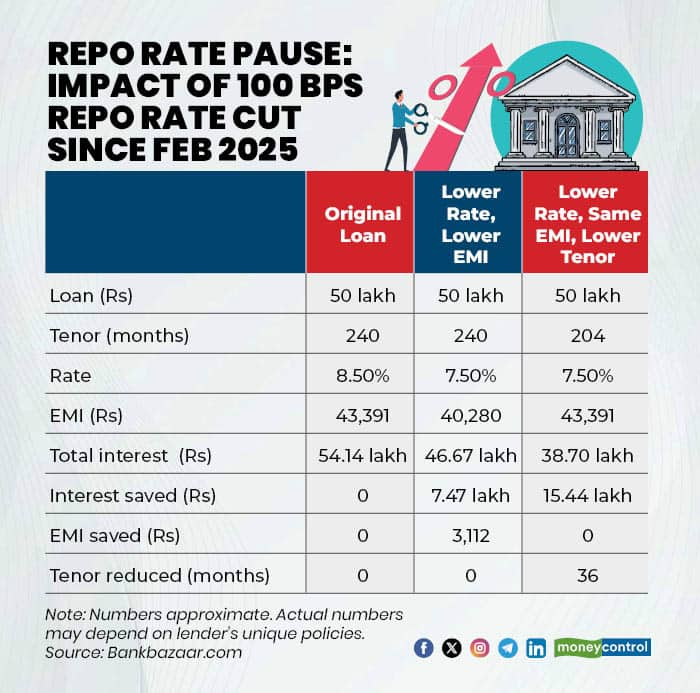
The Reserve Bank of India's decision to hold the repo rate steady at 5.5 percent on October 1 means your home loan EMIs and interest burden will stay unchanged.
The decision is in line with Moneycontrol’s poll of economists that had projected a status quo on interest rates. Between February and June this year, the RBI MPC had lowered the repo rate by 100 bps, ensuring the lowest home loan rates at close to 7.30 percent, with several lenders offer interest rates starting from around 7.50 percent for eligible borrowers.
Leading lenders like Bank of Baroda, Canara Bank, HDFC Bank, ICICI Bank and State Bank of India (SBI) currently offer home loan rates starting at 7.3-8 percent.
Since October 1, 2019, banks have linked floating-rate retail loans to an external benchmark, which is the repo rate in most cases. So, any changes in the repo rate directly influence the interest rates on these loans.
Impact on existing borrowers
As per external benchmark lending rules, banks must pass on policy rate changes to borrowers. Since the RBI kept the repo rate steady, your home loan interest rates and EMIs will stay the same.
Typically, unless explicitly asked, banks keep the EMIs unchanged post repo rate revisions -- tenures are shortened in the case of rate cuts. When rates go up, banks are mandated by the RBI to give borrowers the option to choose between higher EMIs, longer tenure, or a combination of both to adjust to the higher rates.
Follow our live blog for the latest on the RBI policy decisions
For instance, if your Rs 50 lakh, 20-year home loan at 8.5 percent interest was disbursed in January, you would have gained significantly from a 100-bps rate reduction. This would shorten your loan tenure to 204 months and save around Rs 15.44 lakh in interest payments.
If you choose to reduce your EMI amount instead, your interest savings will be relatively lower. You will save around Rs 7.47 lakh instead of Rs 15.44 lakh by keeping EMIs constant.

Festive offers from the banks
Several banks have announced festive offers and charging competitive home loan interest rates. For instance, Bank of Maharashtra offers home loans starting at 7.35 percent per annum with zero processing fees. Axis Bank and HDFC Bank offer home loans starting at 7.40 percent per annum.
Bank of Baroda's home loan interest rate starts at 7.45 percent per annum, accompanied by low processing charges.
ICICI Bank provides home loans with a processing fee of Rs 5,000 (plus taxes) for salaried customers. IndusInd Bank offers home loans for longer tenures of up to 30 years. These rates and offers may vary based on individual circumstances and are subject to change.
New vs existing borrowers
A BankBazaar comparison of home loan rates as on January 31 and July 31 shows that most public sector banks have reduced interest rates for fresh home loans by 100 bps, in line with the RBI policy action on June 6. However, some private sector banks have not transmitted the entire benefit to new borrowers, choosing to adjust the spread over the repo rate instead.
Borrowers with existing loans at high interest rates may benefit from switching to repo-linked products, which can help reduce interest costs over the long term, according to financial advisors.
Discover the latest Business News, Sensex, and Nifty updates. Obtain Personal Finance insights, tax queries, and expert opinions on Moneycontrol or download the Moneycontrol App to stay updated!
Find the best of Al News in one place, specially curated for you every weekend.
Stay on top of the latest tech trends and biggest startup news.